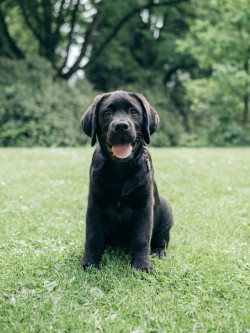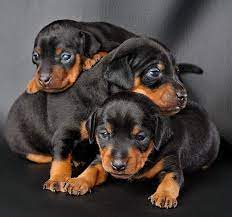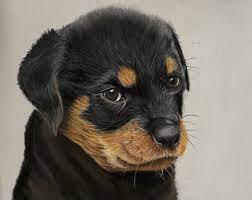German Shepherd Long Coat: Characteristics, Care, and Considerations
Renowned for their unwavering loyalty, keen intelligence, and remarkable versatility, German Shepherds have long held a special place in the hearts of dog enthusiasts. Among the captivating array of characteristics that define this breed, the German Shepherd Long Coat stands as a testament to both beauty and functionality. In this exploration, we delve into the world of the German Shepherd Long Coat, shedding light on its distinctive traits, care requirements, and considerations, aimed at offering invaluable insights to those seeking to welcome one of these majestic companions into their lives.
As a devoted guardian, the German Shepherd Long Coat carries an air of regal elegance, its flowing mane exuding an aura of sophistication that complements its intrinsic qualities. While the breed's reputation for being a steadfast working dog remains unchanged, the long coat variety introduces an element of grace that has captured the admiration of many. Let us embark on a journey to uncover the nuances that set the German Shepherd Long Coat apart, providing prospective owners with the knowledge to make informed decisions and embark on a rewarding partnership with these magnificent animals.
Originating from Germany, the long-haired German Shepherd is a favored herding canine. Rooted in its working breed heritage, this dog has not only earned recognition for its captivating appearance but has also carved a niche as a beloved family companion.
Yet, beneath the allure of the long-haired German Shepherd's striking aesthetics and commendable disposition lies a realm of lesser-known facets waiting to be uncovered.
Are you intrigued to delve deeper into the world of the long-haired German Shepherd and unravel the factors that distinguish it from its traditional short-haired counterpart? If so, you've found the perfect article to satisfy your curiosity.
Appearance of German Shepherd Long Coat
The long coat German Shepherd stands as a testament to natural elegance, its appearance marked by a cascade of luxurious fur that gracefully drapes its well-proportioned frame. This distinctive feature not only enhances its regal presence but also offers a touch of magnificence that sets it apart from its shorter-coated counterparts.
The hallmark of the long coat lies in its plush double coat, consisting of a dense undercoat and longer guard hairs that exude an aura of refinement. These soft, flowing tresses contribute to a sense of allure, creating an almost ethereal impression as they catch the light.
A rich palette of coat colors and patterns further adds to the visual intrigue of the long coat German Shepherd. From the classic sable and black-and-tan to the captivating bi-color and striking solid black variations, each hue serves as a canvas that complements the breed's inherent grace.
In addition to color, patterns such as saddle markings, masks, and blending hues play a role in the long coat's intricate tapestry, bestowing it with a truly individualistic charm. Whether standing proudly or engaged in lively motion, the long coat German Shepherd is a masterpiece of elegance, a harmonious blend of form and fur that captivates both the eye and the heart.
Key characteristics
Height: 22 to 26 Inches Weight: 50 to 90 Pounds Coat Colors: Black, Red and Black, White, Black and Tan, Sable, Black and Silver, Grey Coat Type: Long, Single Layered Coat, Shedding Temperament: Loyal, Intelligent, Affectionate, People-Oriented, Athletic Best Suited For: Experienced Dog Owners but physically and mentally strong-willed first time owners can also be great parents for this demanding breed. Lifespan: 9 to 13 Years Health Issues: Hip Dysplasia, Elbow Dysplasia, Epilepsy, Bloat, Hemophilia, Cataracts, Diabetes,Degenerative Disc Disease, Cancer, Urinary Tract Infections, Dental Disease, Bladder Stones, Thyroid Problems, Allergies, Panosteitis, Allergies, Pancreatitis and Nose Infections.Here are some facts about the long haired German Shepherd.
Long Haired German Shepherd facts
Long Haired German Shepherds Are Not Recognized By Major Breed Clubs
The resplendent cascades of fur adorning the long-haired German Shepherd, while undeniably stunning, are actually regarded as a breed anomaly. This unique coat characteristic renders the long-haired variant ineligible for participation in exhibitions or competitions, positioning it outside the sphere of show ring recognition.
In contrast to its short-haired counterparts within a litter, the long-haired German Shepherd finds itself classified as an aberrant coat type, which can lead to its acquisition at a comparatively reduced price point. This divergence stems from the fact that the long-haired iteration of the breed lacks official endorsement and does not adhere to the recognized breed standard of institutions such as the American Kennel Club.
Nevertheless, this seemingly unconventional trait has not deterred the long-haired German Shepherd from amassing popularity and establishing a firm presence among families, canine enthusiasts, and even professionals in various fields. Despite its extended "defective" coat, the long-haired German Shepherd retains a prominent position as one of the most beloved canine companions in the United States.
Its versatility is evident as it remains a sought-after choice for family households while valiantly fulfilling roles as a service dog, military asset, police aide, and a source of therapeutic support for those in need.
Furthermore, the disparities between the long-haired German Shepherd and its conventionally coated counterpart are marginal, extending primarily to the external aspect of fur. This implies that key aspects including temperament, exercise needs, health considerations, and lifespan remain notably analogous.
While a general rule, it is essential to acknowledge that exceptions to this pattern exist. Let's delve further to expand our understanding.
Litters From a Two Short Haired German Shepherd Parents Can Have Long Haired Puppy
As previously highlighted, it's not uncommon for a long-haired German Shepherd to share a litter with its short-coated counterparts. This occurrence is quite prevalent and well-documented. The presence of the long-haired gene in German Shepherds operates as a recessive trait, which signifies that even short-haired GSDs have the potential to carry this gene.
This intriguing genetic characteristic translates into a scenario where a pair of short-haired German Shepherd parents can yield a litter encompassing both short and long coats. Interestingly, meticulous breeders who meticulously select parent dogs based on their pedigrees may still find themselves with long-coated German Shepherd puppies.
However, the pivotal point to note here is that for the long-haired gene to manifest in their offspring, both parent breeds must carry this recessive gene in their genetic makeup.
It's noteworthy that while the long-haired gene has been classified as a genetic anomaly in German Shepherds, it holds no sway over the health, disposition, or lifespan of these canines. For owners seeking a loyal companion, this distinction often holds little significance. Nevertheless, if your intention is to exhibit your German Shepherd under the banner of the American Kennel Club, it's essential to opt for a classic short-haired German Shepherd, as the long coat would preclude your dog's participation in shows or competitions.
Long Haired German Shepherd Requires More Grooming Time
Due to the absence of a woolly undercoat in long-haired German Shepherds, many assume that these dogs shed less, produce minimal dander, and accumulate fewer debris in their fur, thus making grooming a breeze.
Contrary to this notion, the reality is quite the opposite. Long-haired German Shepherds tend to shed a bit more, and experts point out that owners are likely to notice a more substantial amount of hair being released from their coats during brushing sessions.
Adding to this, the coats of long-haired German Shepherds can extend beyond two inches in length and possess a silkier texture compared to their short-coated counterparts. As a result, they are more susceptible to matting, underscoring the importance of diligent care.
To prevent matting and minimize shedding, it's recommended to brush your long-haired German Shepherd two to three times per week, a frequency higher than that of their shorter-coated peers.
Reducing shedding begins with a high-quality diet, along with adhering to routine grooming, brushing, and bathing sessions. Selecting appropriate products plays a pivotal role in maintaining the health of your long-haired German Shepherd's coat.
When bathing your canine companion, avoid excessive washing – limiting it to once every few weeks. Opt for a quality dog shampoo devoid of dyes, parabens, or chemicals that could strip the skin of its natural oils.
For breeds like the long-haired German Shepherd that may be prone to skin and coat issues, we recommend employing an organic dog shampoo like the Oatmeal Pet Wash mentioned earlier. This soothing shampoo is free from any additives that might exacerbate allergies, contributing to itch relief and healthier coats.
In addition to the right shampoo, adhering to a regular brushing routine, and maintaining a healthy bathing schedule, experts recommend daily teeth brushing using dog-safe toothpaste and a toothbrush. Regular nail trimming is also essential to prevent cracking and splitting, while attentiveness to ear hygiene – keeping them clean and dry – is vital to stave off infections and odor.
Long Coat GSDs have the same health issues
While the long-haired German Shepherd's coat may be categorized as a genetic peculiarity, it's important to recognize that the overall health and lifespan of the long-haired GSD remain comparable to that of its short-haired counterpart. This parity is particularly evident when obtaining your dog from reputable sources that prioritize the breed's well-being.
On average, the long-haired German Shepherd enjoys a lifespan of approximately 10 to 13 years. As with any breed, there are potential health considerations that warrant attention, encompassing a range of factors including but not limited to:
To proactively address potential health matters in your long-haired German Shepherd, it's essential not only to provide him with a high-quality dog food tailored to his age, weight, and activity level, but also to uphold a consistent grooming regimen and ensure regular visits to the veterinarian for routine check-ups.
Veterinarians often recommend that large breed dogs under the age of seven undergo at least one wellness examination annually. For dogs aged seven and above, biannual visits to the vet are advised.
As your long-haired German Shepherd advances in age, the incorporation of joint supplements into his diet can help mitigate potential bone and joint concerns. Furthermore, some experts suggest early health screenings for your dog to gain insights into potential future health considerations.
By attending to these key aspects, you can significantly contribute to the well-being and longevity of your cherished long-haired German Shepherd companion.
Hip Dysplasia: A developmental disorder of the hip joint, where the hip socket and the thighbone do not fit together properly, potentially leading to arthritis and discomfort.
Elbow Dysplasia: A group of inherited conditions affecting the elbow joint, often causing pain, lameness, and eventually leading to arthritis.
Epilepsy: A neurological disorder characterized by recurrent seizures, which may vary in frequency and severity.
Bloat (Gastric Dilatation-Volvulus): A life-threatening condition where a dog's stomach fills with gas, causing it to twist, leading to rapid expansion and potential blockage of blood flow.
Hemophilia: A genetic bleeding disorder where the blood doesn't clot properly, resulting in prolonged bleeding even from minor injuries.
Cataracts: Clouding of the eye's lens, leading to impaired vision and potential blindness.
Diabetes: A metabolic disorder where the body struggles to regulate blood sugar levels, requiring management with insulin injections and dietary changes.
Degenerative Disc Disease: The gradual deterioration of spinal discs, often leading to pain, nerve damage, and mobility issues.
Cancer: Abnormal cell growth that can affect various organs, potentially requiring surgery, chemotherapy, or radiation treatment.
Urinary Tract Infections: Bacterial infections in the urinary system that may cause frequent urination, pain, and discomfort.
Dental Disease: Buildup of plaque and tartar on teeth, leading to gum inflammation, tooth loss, and potential infections.
Bladder Stones: Mineral deposits that form in the bladder, causing pain, urinary issues, and potential blockages.
Thyroid Problems: Hormonal imbalances affecting the thyroid gland, leading to issues with metabolism, energy levels, and overall health.
Allergies: Immune system reactions to certain substances, resulting in skin irritation, itching, and respiratory symptoms.
Panosteitis: A bone disorder causing inflammation and pain in the long bones of young, growing dogs.
Pancreatitis: Inflammation of the pancreas, often caused by dietary indiscretion, leading to abdominal pain, vomiting, and potential complications.
It's important to note that early detection, proper veterinary care, and responsible breeding practices can play a significant role in managing or preventing these conditions in dogs.
Long Coat GSD Temperament
Long coat German Shepherd puppies inherit a disposition that harmoniously intertwines with the breed's celebrated attributes of loyalty, intelligence, and remarkable trainability. These foundational qualities, characteristic of the German Shepherd breed, lay a solid foundation for a fulfilling and devoted companionship.
While the coat's luxurious length adds an additional layer of allure, it's important to address any potential nuances that might emerge in terms of temperament. The influence of the coat length on the puppy's behavior is subtle, if at all. It's important to emphasize that the essence of a long coat German Shepherd's personality remains inherently aligned with the breed standard.
This means that whether adorned with flowing fur or the more conventional short coat, the long coat German Shepherd puppy is equally primed to demonstrate unwavering loyalty to its family, showcase remarkable intelligence in learning commands and tasks, and exude an eagerness to engage in constructive training sessions. In essence, the captivating coat length may add to their visual charm, but their core temperament remains rooted in the breed's cherished characteristics.
Difference in temperatment: Long Coat GSD Vs Short Coat GSD
While the fundamental temperament traits of loyalty, intelligence, and trainability are inherent in both long coat and short coat German Shepherds, there can be subtle differences in behavior and disposition that arise due to coat length. It's important to note that individual variation within the breed is significant, and while coat type might contribute to certain tendencies, it's not the sole determinant of a dog's personality. Here's an elaboration on the potential differences:
Social Interaction and Sensitivity:Long coat German Shepherds might exhibit a slightly more gentle and sensitive demeanor compared to their short coat counterparts. This could make them particularly attuned to subtle changes in their environment, which could lead to heightened awareness and responsiveness.
2. Confidence and Outgoingness:Short coat German Shepherds often have a confident and outgoing personality, which may make them more willing to approach new situations and people with ease. Long coat German Shepherds, while still confident and self-assured, might demonstrate a more reserved approach in certain scenarios.
3. Protective Instincts:Both long coat and short coat German Shepherds possess strong protective instincts. However, long coat German Shepherds might manifest these instincts in a more controlled and measured manner, potentially making them exceptionally well-suited for roles as family protectors or guard dogs.
4. Adaptability to Climate:Long coat German Shepherds, with their luxurious fur, might show a greater tolerance for colder climates due to their added insulation. On the other hand, short coat German Shepherds, while also well-adapted, might be slightly more sensitive to extreme cold.
5. Energy Levels:While energy levels can vary widely within the breed, some long coat German Shepherds could exhibit a touch more calmness, especially in indoor settings. This could contribute to a slightly less intense playfulness indoors compared to their short coat counterparts.
6. Trainability and Obedience:Both coat types are highly trainable and obedient, given their inherent intelligence and willingness to learn. However, some long coat German Shepherds might showcase an elevated desire to please their owners, which can lead to even more enthusiastic and focused training sessions.
It's important to approach these potential differences with an open mind and remember that the individual dog's genetics, early socialization, training, and environment play a significant role in shaping their personality. When considering a long coat or short coat German Shepherd, it's crucial to focus on finding a well-bred, healthy puppy with a temperament that aligns with your lifestyle and preferences.
Long Coat German Shepherd Colors
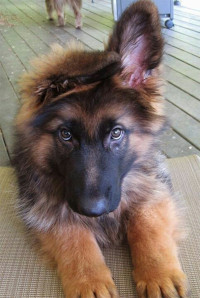
Long Haired GSD Puppy
Long Haired GSD Puppy come in different shades of black and tan
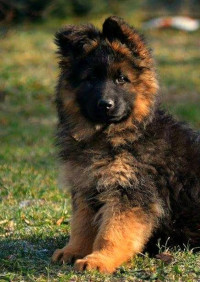
Long Haired GSD Puppy
Long Haired GSD Puppy come in all colors as short coat GSD
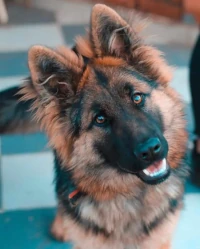
Long Haired GSD Puppy
In some parts of the world, long coat GSD puppies are more in demand than the sort coat GSD puppies.
Long Coat German Shepherd - Care and Grooming
Long coat German Shepherds not only capture hearts with their majestic appearance but also demand dedicated care and grooming to ensure their well-being and radiant presence. Here, we delve into essential practices that will help you maintain your long coat German Shepherd's health, comfort, and elegance.
Coat Maintenance: Preserving Beauty and Vitality
Regular brushing is a cornerstone of long coat German Shepherd care. Brushing serves as more than a grooming ritual – it's a means to prevent matting, enhance circulation, and distribute natural oils for a lustrous sheen. Opt for specialized brushes like slicker brushes and undercoat rakes that are adept at navigating the dense fur while detangling any knots or snarls that may arise.
Bathing and Drying: Refreshing the Luxurious Cascade
Bathing your long coat German Shepherd should align with their activity level and lifestyle. On average, a bath every two to three months is suitable. When bathing, use a dog-specific shampoo, gently massaging it through the coat. Afterward, thorough drying is crucial to avoid trapped moisture, which could lead to skin issues. Utilize a high-quality dog dryer or towels to ensure a completely dry coat.
Seasonal Considerations: Adapting Elegance to Climate
Long coat German Shepherds exhibit remarkable adaptability, but it's essential to be attuned to seasonal changes. In hot weather, ensure they have access to shade and cool water to prevent overheating. Trimming their coat slightly during warmer months can aid in temperature regulation. Conversely, during colder seasons, their natural insulation proves advantageous, though additional shelter and protection may be needed during extreme conditions.
Nutrition and Hygiene: Fostering Inner and Outer Well-Being
A balanced diet plays a pivotal role in sustaining a vibrant coat. Essential fatty acids, found in sources like fish oil, contribute to healthy skin and fur. Routine nail trimming prevents discomfort and maintains mobility, while regular ear cleaning prevents infections and discomfort.
Your long coat German Shepherd's allure extends beyond appearances – it encompasses their vitality, comfort, and joy. By embracing these care and grooming practices, you pave the way for a harmonious partnership with your elegant canine companion, ensuring they radiate confidence and splendor in every step they take.
Long Coat German Shephered - Raw Vs Processed food
The debate between feeding raw and processed food to long coat German Shepherds is a consideration that extends beyond coat type, encompassing individual preferences, dietary needs, and potential health benefits. Both options can offer a balanced diet when approached thoughtfully.
Feeding Raw Food: Advocates of raw feeding emphasize its natural and primal aspect, akin to what dogs' ancestors might have consumed. Proponents often claim benefits such as improved coat health, enhanced digestion, and potential relief from allergies. However, it requires careful planning to ensure proper nutritional balance, as raw diets may lack essential nutrients if not well-constructed.
Processed Food (Kibble or Canned): Commercially prepared processed dog food offers convenience and ease of feeding, with established guidelines to meet a dog's nutritional requirements. High-quality processed food options can contain a well-balanced mix of protein, carbohydrates, fats, vitamins, and minerals. While some argue that processed diets might not match the nutritional richness of raw food, many well-respected brands offer formulations designed to support coat health and overall well-being.
Nutrition for Long Coat vs. Short Coat German Shepherds:Both long coat and short coat German Shepherds share similar nutritional needs, with coat length playing a minimal role in determining dietary requirements. Instead, factors such as age, activity level, metabolism, and health status should guide nutritional choices. The main distinction lies in maintaining optimal skin and coat health, for which both types can benefit from diets rich in omega-3 fatty acids, sourced from fish oil or other appropriate supplements.
Hygiene: Inner and Outer BalanceHygiene practices for long coat German Shepherds mirror those of their short coat counterparts. Regular grooming, nail trimming, and ear cleaning are essential for both coat types to prevent discomfort and potential health issues. When comparing nutritional and hygiene needs, the focus remains on holistic well-being, regardless of coat length.
Ultimately, the choice between raw and processed food should be based on thorough research, consultation with veterinarians, and consideration of your long coat German Shepherd's individual needs. Nutrition and hygiene remain integral facets of maintaining a vibrant, comfortable, and healthy life for your cherished companion, regardless of the coat they wear.
Training Tips
- Positive Reinforcement: Long Coat German Shepherds respond best to positive reinforcement training methods. Use praise, treats, and rewards to reinforce desired behaviors. Avoid harsh punishment or aggressive training techniques, as they can lead to fear or aggression in the dog.
- Consistency: Consistency is key when training a Long Coat German Shepherds. Set clear rules and boundaries and ensure that all family members enforce them consistently to avoid confusion.
- Early Training: Start training and socialization as early as possible. Long Coat German Shepherds puppies are highly impressionable, and early training helps build a strong foundation for their behavior as adults.
- Obedience Training: Basic obedience training is essential for a well-behaved Long Coat German Shepherds. Teach them commands like sit, stay, come, and leash walking. Advanced training, such as off-leash recall and more complex commands, can also be beneficial.
- Leadership: Long Coat German Shepherds have a strong pack mentality and look for a leader within the family. Be firm, fair, and consistent in your training to establish yourself as the pack leader, which will help foster a well-balanced and obedient dog.
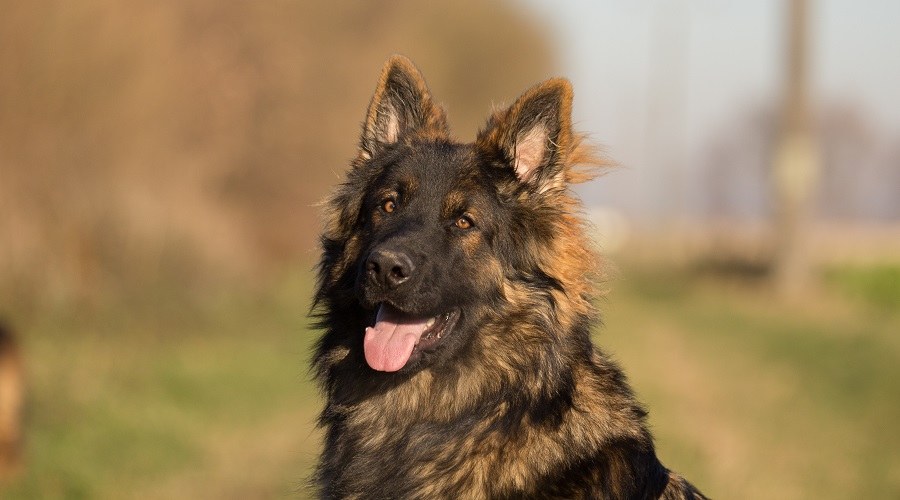
Long Coat German Shepherd - Finding a Reputable Breeder or Adoption Center
When considering adding a Long Coat German Shepherds to your family, finding a reputable breeder or adoption center is of utmost importance. Responsible breeders and adoption centers prioritize the health, well-being, and temperament of their dogs, ensuring that you bring home a happy and healthy companion. Here are some essential steps to guide you in finding a reputable source for your Long Coat German Shepherd:
Research and Referrals
Start by conducting thorough research. Look for breeders or adoption centers with a good reputation and positive reviews from previous customers. Seek recommendations from friends, family, or local dog clubs who may have experience with Long Coat German Shepherds or know reputable sources.
Visit in Person
If possible, visit the breeder or adoption center in person. This allows you to see the living conditions of the dogs and assess the overall cleanliness and care provided. Pay attention to the dogs' behavior and interactions with people, which can give you insights into their socialization.
Health Screening
Reputable breeders prioritize the health of their dogs and conduct necessary health screenings. Ask the breeder about health clearances for genetic conditions commonly found in Long Coat German Shepherds, such as hip dysplasia and heart issues. Adoption centers should also provide health records for their dogs.
Temperament Assessment
A responsible breeder or adoption center will conduct temperament assessments on their dogs. This helps match the right puppy or dog to your family's lifestyle and needs.
Meet the Parents
If possible, meet the puppy's parents or the adult dog's parents in the case of adoption. Observing the parents' temperament and behavior can give you an idea of what to expect from their offspring.
Ask Questions
Don't hesitate to ask the breeder or adoption center staff any questions you may have about the dogs, their lineage, health, and upbringing. Reputable sources will be open and transparent in answering your inquiries.
Contracts and Guarantees
A responsible breeder or adoption center will provide you with a written contract that outlines the terms of the sale or adoption. It should include health guarantees and a return policy in case the dog develops any health issues or doesn't fit well into your family.
No Puppy Mills
Avoid purchasing from puppy mills or disreputable breeders. Puppy mills prioritize profit over the health and welfare of the dogs. Puppies from these sources are often raised in poor conditions and can have significant health and behavioral issues.
Adoption Centers and Rescues
Consider adopting a Long Coat German Shepherd from a rescue center or animal shelter. Many wonderful Long Coat German Shepherds are in need of loving homes through adoption. Adoption provides a second chance for a dog and can be a rewarding experience for both the dog and the owner.
Finding a reputable breeder or adoption center is essential for bringing a healthy, well-socialized, and happy Long Coat German Shepherd into your family. Take your time to research and visit potential sources, ensuring that they prioritize the well-being of their dogs. By choosing a responsible breeder or adopting from a reputable center, you are making a commitment to provide a loving and caring home for your Long Coat German Shepherd companion.
Long Coat German Shepherd Fun Facts
Beyond their imposing appearance and protective nature, Long Coat German Shepherds have some intriguing and endearing characteristics that make them a fascinating breed. Here are some fun facts about these magnificent dogs:
- Luxurious Locks: Long Coat German Shepherds sport a stunning, flowing coat that sets them apart from their short-haired counterparts. Their elegance and charm capture attention wherever they go.
- Unofficially Fabulous: While not recognized as an official breed standard by some kennel clubs, Long Coat German Shepherds have still carved a niche as beloved family pets and companions.
- Guardians of Comfort: Their longer fur provides them with additional insulation, making them a cozy choice for colder climates. These fur guardians offer comfort and warmth to their families during chilly weather.
- Loyal Lushness: These dogs exude the same loyalty, intelligence, and trainability as their short-coated peers, showcasing that their luxurious exterior doesn't alter their admirable character traits.
- Matting Matters: Their longer coats require regular grooming to prevent matting and tangling. But don't worry, the grooming routine can be a wonderful bonding experience between you and your furry friend.
- Puppyhood Pleasures: Long Coat German Shepherd puppies are irresistibly cute with their fluffy fur, making them even more huggable and adorable during their early stages.
- Diverse Colors: Just like their short-coated counterparts, Long Coat German Shepherds come in a variety of coat colors, including classic black and tan, sable, and even all-black.
- Working Wonders: Despite their captivating appearance, many Long Coat German Shepherds continue to excel in various roles, from working in search and rescue to serving as therapy dogs, showcasing their versatility beyond their looks.
- Popularity Points: Long Coat German Shepherds have steadily gained popularity as beloved family companions, demonstrating that their allure goes far beyond their eye-catching appearance.
- Tail-Wagging Tidbit: Long Coat German Shepherds' tails can be a bit bushier, adding a touch of flair to their wagging greetings and playful antics.
- Allergen Allies: Some individuals with allergies might find Long Coat German Shepherds more manageable than other breeds, as their longer fur might trap dander closer to their bodies.
- Show-Stopping Pets: While not eligible for certain dog shows due to coat length, Long Coat German Shepherds are undoubtedly show-stoppers in the hearts of their families, showcasing that beauty comes in all styles.
- Eager Learners: While Long Coat German Shepherds are renowned for their herding and guarding abilities, they are versatile working dogs with a range of talents. They have excelled in roles such as police work, search and rescue, therapy dog, and even in competitive dog sports like obedience and agility.
- Versatile Working Dogs: Apart from being great family pets, Labradors are versatile working dogs. They are employed as service dogs, therapy dogs, search and rescue dogs, guide dogs for the visually impaired, and even as detection dogs for drugs and explosives.
- Amazing Memory: Long Coat German Shepherds are known for their impressive memory and ability to learn from past experiences. This makes them excellent learners during training sessions.
- Outstanding Intelligence: Long Coat German Shepherds ranks quite high in intelligence among dog breeds. Their intelligence, combined with their loyalty and work ethic, makes them adept at various tasks and roles.
- Great with Kids: With proper socialization and training, Long Coat German Shepherds can be fantastic family dogs. They are often gentle, patient, and protective of children, forming strong bonds with their young human companions.
Long Coat German Shepherds are not only magnificent guard dogs and working dogs but also fascinating companions with a rich history and unique traits. Learning about these fun facts adds another layer of appreciation for the breed's enduring legacy and their special place in the hearts of dog enthusiasts around the world.
Frequently Asked Questions about Long Coat German Shepherd
Are Long Coat German Shepherds aggressive?
No, Long Coat German Shepherds are not inherently aggressive, but they are naturally protective. Proper socialization, training, and responsible ownership play a crucial role in shaping their temperament and behavior.
How big do Long Coat German Shepherds get?
Long Coat German Shepherds are large dogs, with males typically standing between 24 to 27 inches (61 to 69 cm) at the shoulder and weighing between 95 to 135 pounds (43 to 61 kg). Females are slightly smaller, ranging from 22 to 25 inches (56 to 63 cm) and weighing between 80 to 100 pounds (36 to 45 kg).
Are Long Coat German Shepherds good with children?
Yes, Long Coat German Shepherds are known for their gentle and friendly nature, making them excellent companions for children. They are patient and tolerant, and their playful demeanor makes them great playmates for kids. However, as with any dog, supervision and teaching kids how to interact respectfully with dogs are crucial.
Do Long Coat German Shepherds shed a lot?
Yes, Long Coat German Shepherds do shed throughout the year, with heavier shedding occurring during seasonal changes. Regular brushing helps manage their shedding and keeps their coat healthy.
How much exercise do Long Coat German Shepherds need?
Long Coat German Shepherds are active dogs that require regular exercise to stay healthy and mentally stimulated. Aim for at least 60 to 90 minutes of exercise daily, which can include walks, playtime, and interactive activities.
Do Long Coat German Shepherds get along with other pets?
Long Coat German Shepherds can get along well with other pets, especially when introduced and socialized properly. However, their strong prey drive and protective instincts may require careful supervision during interactions with smaller animals.
Do Long Coat German Shepherds drool a lot?
Long Coat German Shepherds are not excessive droolers compared to some other breeds. However, some individual Long Coat German Shepherds may drool more than others, especially after eating or drinking.
Are Long Coat German Shepherds good guard dogs?
Yes, Long Coat German Shepherds are excellent guard dogs due to their natural protective instincts and loyalty to their family. Their intimidating presence and deep bark often deter potential intruders.
How long do Long Coat German Shepherds live?
On average, Long Coat German Shepherds have a lifespan of around 9 to 12 years, with some known to have lived up to 15 years. Proper diet, regular exercise, and routine veterinary care can contribute to their overall health and longevity.
Can Long Coat German Shepherds be trained for specific purposes, such as therapy or service work?
Yes, Long Coat German Shepherds are highly trainable and versatile dogs, making them well-suited for therapy and service work. Their gentle and friendly nature allows them to excel in roles as therapy dogs, providing comfort and emotional support to individuals in various settings. They can also be trained for service work to assist people with disabilities.
Are Long Coat German Shepherds good for first-time dog owners?
Long Coat German Shepherds can be suitable for first-time dog owners, but it depends on several factors, including the individual's experience, commitment, and lifestyle. While Long Coat German Shepherds are intelligent, loyal, and affectionate, they are also a powerful and strong-willed breed that requires consistent training and socialization from an early age.
Training and Socialization:Long Coat German Shepherds benefit from early and consistent training, and socialization is crucial to help them become well-adjusted and well-behaved pets. First-time owners should be willing to invest time and effort into training classes and exposure to various people, places, and situations.
Exercise Requirements:Long Coat German Shepherds are active dogs with considerable exercise needs. First-time owners should be prepared to provide daily physical activity and mental stimulation to keep their Long Coat German Shepherd happy and healthy.
Size and Strength:Long Coat German Shepherds are large and powerful dogs. First-time owners should feel confident in their ability to handle and control a strong dog, especially during walks and interactions with other animals.
Consistency and Leadership:Long Coat German Shepherds respond well to consistent leadership and clear boundaries. First-time owners should be firm but fair in their approach to training and avoid any harsh or punitive methods.
Time and Commitment:Long Coat German Shepherds are a devoted and loyal breed that thrives on companionship. First-time owners should be prepared to spend quality time with their Long Coat German Shepherd, as these dogs can become unhappy and exhibit undesirable behaviors if left alone for extended periods.
Social Support and Resources:First-time Long Coat German Shepherd owners may benefit from having a support network of experienced dog owners or access to reputable dog trainers or behavioral experts to help with any challenges that may arise.
Ultimately, a first-time dog owner who is willing to put in the time, effort, and dedication to train, exercise, and care for a Long Coat German Shepherd can have a rewarding and loving relationship with this remarkable breed. However, if someone feels unsure or overwhelmed by the responsibilities that come with owning a Long Coat German Shepherd, it may be best to consider a breed that better matches their experience and lifestyle. Responsible breeders and adoption centers can help guide potential owners in making the right choice for their situation.
Are Long Coat German Shepherds easy to train?
Yes, Long Coat German Shepherds are generally easy to train due to their intelligence and eagerness to please. They respond well to positive reinforcement training methods and enjoy learning new commands and tricks. Consistency, patience, and rewards are essential for successful training with Long Coat German Shepherds.
Conclusion
In conclusion, In the world of canine companions, the Long Coat German Shepherd stands tall as a magnificent breed with a rich history and a devoted heart.
Their imposing appearance, combined with their intelligence, loyalty, and protective instincts, has made them sought-after working dogs, guardians, and loving companions worldwide. In India, the popularity of Long Coat German Shepherds continues to grow, as families welcome these remarkable dogs into their homes and hearts.
Aspiring Long Coat German Shepherd owners should recognize the commitment and responsibility that comes with bringing home one of these majestic dogs. Proper socialization, training, and regular exercise are paramount in fostering a well-balanced and well-mannered Long Coat German Shepherd.
For those seeking a new addition to their family, adoption from a reputable rescue center or responsible breeder can provide a loving forever home to a Long Coat German Shepherd in need.
Above all, responsible ownership and unconditional love form the foundation of a lifelong bond with a Long Coat German Shepherd. They thrive in environments where they are valued as devoted family members, provided with the care they deserve, and given opportunities to shine in their various roles.
Whether they are guarding the homestead, participating in dog sports, or simply curling up by your side, Long Coat German Shepherds have a unique ability to touch our lives with their loyalty, strength, and affection. The journey of sharing life with a Long Coat German Shepherd is one that promises joy, protection, and unbreakable camaraderie.
As we embark on this journey with our loyal companions, let us remember the ancient legacy of the Long Coat German Shepherd, honor their devoted spirit, and continue to embrace them as beloved members of our families, enriching our lives with their steadfast companionship.
